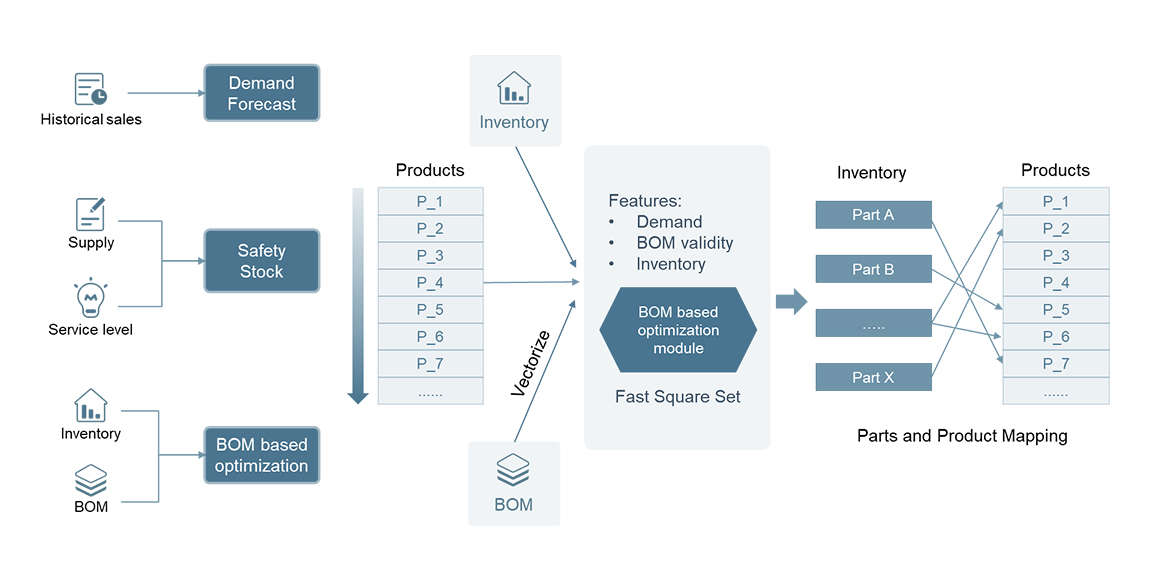
One transformative solution that has gained significant traction in the manufacturing industry is SAP implementation. The market size of SAP Digital Services Ecosystem was valued at roughly US$ 97.49 billion in 2022, which is expected to reach US$ 154.44 billion by 2030 with a CAGR of 6.79%. The manufacturing industry has witnessed a remarkable transformation through SAP implementation. Most of the manufacturers have either implemented or are planning to implement SAP solutions to optimize their operations.
In this blog post, we will delve into the pivotal role of SAP implementation in the manufacturing sector, the importance of selecting the right SAP service provider, and how a top-tier SAP services company can make all the difference.
How SAP Works in Manufacturing
SAP’s role in manufacturing is multifaceted and pivotal for optimizing operations. At its core, SAP is an enterprise resource planning (ERP) system that integrates various aspects of a manufacturing organization, from production and inventory management to supply chain logistics. SAP operates through a centralized database, providing real-time access to critical data and insights. For example, it enables demand forecasting, allowing manufacturers to align production with market needs, thereby minimizing overproduction and reducing costs.
Moreover, SAP’s Manufacturing Execution System (MES) module monitors the shop floor in real-time, tracking machine performance, quality control, and material flow. This ensures that production processes remain efficient and deviations from quality standards are immediately addressed, reducing downtime and improving product quality.
The companies that implement SAP in the manufacturing sector experience a reduction in overall production costs and as much as 60% increase in operational efficiency. Additionally, SAP’s predictive maintenance capabilities help reduce downtime, a critical concern in manufacturing, by allowing companies to perform timely equipment maintenance.
This way businesses can see a reduction in unplanned downtime. Thus, SAP empowers manufacturers with the tools to optimize operations, reduce costs, improve quality, and increase overall productivity, making it an indispensable asset in the modern manufacturing industry.
The Benefits of SAP Implementation
In recent years, SAP implementation has gained significant traction in the manufacturing industry. The key question on the minds of many manufacturing decision-makers is, Why should we implement SAP? The answer lies in the numerous benefits it offers.
SAP implementation helps manufacturing companies optimize their operations in the following ways:
- Streamlined Supply Chain Management: By integrating various processes and providing real-time visibility into the supply chain, SAP helps companies minimize lead times and reduce inventory costs.
- Improved Production Planning: SAP’s advanced planning tools assist in optimizing production schedules, minimizing production bottlenecks, and ensuring that the right products are available at the right time.
- Enhanced Quality Control: With SAP, manufacturers can implement stringent quality control measures, reducing defects and product recalls. This not only ensures customer satisfaction but also saves costs associated with quality issues.
Why SAP Services Company Matters
Partnering with a reputable SAP services company can be a game-changer in your SAP implementation journey. These companies bring a wealth of knowledge and experience to the table, offering comprehensive support throughout the project lifecycle.
A top-tier SAP services company doesn’t just focus on technical implementation; they take a holistic approach. They work closely with your team to understand your business goals and objectives, aligning SAP solutions with your strategic vision.
SAP implementation is not a one-time event; it’s an ongoing process. A reliable SAP services company provides post-implementation support, ensuring that your SAP system remains optimized and up to date. This long-term partnership is invaluable for manufacturers.
Selecting the Right SAP Service Provider
Now that we’ve established the advantages of SAP implementation, the next step is to choose the right SAP service provider. This decision is crucial to the success of your SAP project.
- Assessing Expertise and Experience:
When looking for an SAP service provider, it’s imperative to assess their expertise in the manufacturing industry. An experienced SAP services company will be familiar with the unique challenges and requirements of the sector, ensuring a smoother implementation process.
- Customer References and Case Studies:
A reliable SAP service provider should be able to provide customer references and case studies from previous manufacturing projects. This demonstrates their ability to deliver results in real-world scenarios.
- Customization Capabilities:
Manufacturing businesses often require customized solutions to meet their specific needs. A good SAP service provider should have the expertise to tailor SAP systems accordingly.
- Post-Implementation Support:
It’s essential to ensure that the SAP service provider offers comprehensive post-implementation support. The support is crucial to the project’s longer success.
Maximizing ROI with SAP Implementation
The return on investment (ROI) for SAP implementation in the manufacturing industry is substantial. A well-planned implementation can significantly improve your operational efficiency, reduce costs, and boost profitability.
- Cost Reduction:
According to a recent survey, manufacturing companies that implemented SAP solutions saw an average reduction in operational costs of 15%. This was primarily due to improved resource allocation and inventory management.
- Productivity Gains:
Manufacturers have reported an increase in overall productivity after SAP implementation. This is attributed to better production planning, reduced downtime, and improved resource allocation.
- Quality Improvements:
Quality control measures have seen an increase in operational efficiency after SAP implementation. This leads to a decrease in defective products and warranty claims.
- Faster Time-to-Market:
Manufacturers who have adopted SAP have experienced up to a 25% reduction in time-to-market for new products, enabling them to respond more swiftly to changing market demands.
Conclusion
In conclusion, SAP implementation in the manufacturing industry is a transformative step towards optimizing operations, enhancing productivity, and reducing costs. Selecting the right SAP service provider or SAP services company is crucial to ensuring a successful implementation that maximizes ROI. By integrating SAP into your manufacturing processes, you can streamline supply chain management, improve production planning, enhance quality control, and ultimately drive operational excellence.
Have you considered SAP implementation for your manufacturing operations? Share your thoughts, questions, or experiences with us here. We have seasoned experts in SAP implementation who can craft a customized solution for your manufacturing business
